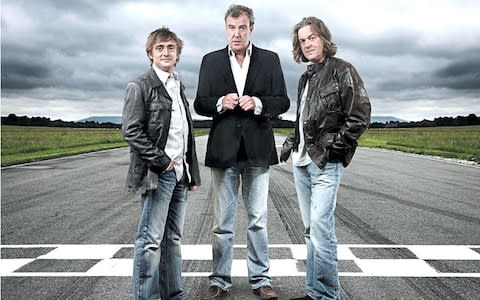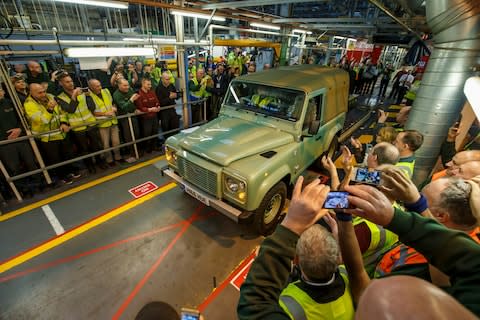Jim Ratcliffe: the billionaire who wants to arrest Britain's manufacturing decline

Jim Ratcliffe is holding court in the Grenadier pub in London’s Belgravia, talking about his plans to build a successor to his orange Land Rover Defender parked outside.
“It was just there at the bar,” he says, when asked where he decided to invest upwards of half a billion pounds into building his dream car. “It was after the second pint.”
Tall and lean with windblown hair, and dressed in a creased, open-necked white shirt, if you didn’t know Ratcliffe was one of the richest businessmen in Britain, you’d be unlikely to pick him out as someone who had amassed a fortune estimated at between £3bn and £8bn.
In fact, he looks like an amalgam of Top Gear’s Jeremy Clarkson and James May – his height and dishevelled appearance preclude the inclusion of the third of the cultish car programme’s presenting team, Richard Hammond.

The 64-year-old son of a joiner and office worker’s ambition to build a car is something the Top Gear trio have already tried. But Ratcliffe has the financial firepower, deal-making experience and engineering expertise to make it a success.
He has built Ineos, the company he co-founded in 1998, into one of the world’s top 10 petrochemicals businesses, leasing or buying up unwanted assets from firms such as BP and ICI, using high-yield debt.
“We’re pretty good at engineering,” he says, having announced he’s ready to drop £600m on building the 4x4 car, known as “Projekt Grenadier”. “I think we’ve shown that with what we’ve done with Ineos.”

He casually drops into conversation that he’s expecting Ineos to have revenues of €50bn (£44bn) this year and earnings of between €4bn and €5bn. Asked whether he’s being arrogant assuming he can park his tank – because that’s what he’s basically planning to build, a “rugged, uncompromising, no frills” off-roader – on Jaguar Land Rover’s lawn, and entering the notoriously difficult automotive sector where development costs of one vehicle can run into the billions, he dismisses the question.
If you produce a good product it will sell, we’ve no anxiety about that, it’s where we do the manufacturing that’s a challenge
“We’re not doing this on some nostalgic dalliance: it looked appealing,” he says, adding he is assembling a team of engineers, with 200 of them expected to be working on the project, mainly in Germany, by the end of the year. “If you produce a good product it will sell, we’ve no anxiety about that, it’s where we do the manufacturing that’s a challenge. But we’re brave enough to give it a go.”
The desire to build the car – he wants to go into production within three years and plans to have 25,000 cars rolling off the line a year – comes from his fondness for the Defender, whose manufacturing ended in 2016. Ratcliffe is an adventurer and has made expeditions to both poles and been on a months-long motorbike trek across Africa, a continent where he regularly goes on safari. “When I’m on safari in Africa I always prefer to be in a Land Rover,” he says. “But I always carry a picnic basket.”

He’s referring to what he calls “reliability questions” about the Defender. Ratcliffe’s preferred mode of transport might be able to cross pretty much any terrain but it doesn’t have the bombproof reliability of the Toyota Land Cruiser, the gold standard of mechanics in the 4x4 world.
“It’s going to be pretty much unbreakable but also easy to maintain in the field,” he says. “We’re looking at the engineering to give it what the Land Rover was missing.”
His constant references to the Land Rover might throw up one obstacle that ,Ratcliffe can’t cross. He casually name-drops the JLR car, talking about producing “its spiritual successor” and “having its DNA” but the Indian-owned and Coventry-based company is unlikely to happily hand over a space in the market it dominated.
A new Defender is due out in 2019 and JLR has filed a series of trademark applications on its earlier vehicles, which Ratcliffe has opposed. This is just one problem to overcome. Finding a site to actually build the cars is another. Ratcliffe says he wants to build in Britain to capitalise on the Britishness of the new car. He’s talking to the Government about financial support to help build a plant, saying that receiving such aid “is not insurmountable but a challenge: look at Nissan and Toyota, they’ve done it”.
How likely the Government is to pump cash into a high-risk venture that’s an offshoot of a privately held business that has not always embraced the corporate governance standards demanded of public companies of similar sizes is questionable. Some say Ratcliffe is Ineos, and as chairman he runs the business as he sees fit.

Questioned about changing corporate governance at Ineos – such as getting women on the board – to make the company more palatable to the Government, Ratcliffe again tries to bat away any concerns.
“We’ve got senior girls,” he says, to winces from women in the room. “Our head of tax and HR are girls.”
Controlling two thirds of Ineos gives him the freedom to embark on ventures such as Projekt Grenadier but bringing in taxpayers’ money might come with strings attached.
We absolutely have an emotional attachment to the UK, but we cannot let that override the economics
“Building the car here would create 1,000 jobs directly and up to 10,000 in the supply chain,” says Ratcliffe. “So it gets a big tick in the jobs box for government. We absolutely have an emotional attachment to the UK, but we cannot let that override the economics. It might need government money to build it here.”
Talks are also being held with the EU about possible funding for the plan, and he admits that simply moving into a vacant car plant in a country such as Germany would cut costs. Maybe talk of building in Britain is just a marketing exercise but Ratcliffe says he is dedicated to British manufacturing. “There’s no reason why we are where we are as opposed to Germany,” he says. “We need to be supportive to manufacturing in this country.
“There’s just no reason to think we can’t manufacture in Britain if we do things right,” he says. “The UK can produce products as reliable as the Germans. I mean look at the car industries 50 years ago: in Britain we were building Morris Minors and in Germany they were building VW Beetles – they were very similar.”

Car production at scale has moved on in Germany while withering in the UK, though it has enjoyed something of a renaissance here during the past four years. “I won’t accept that we can’t do it in Britain,” says Ratcliffe, adding: “We have to arrest the decline in manufacturing here.”
He adds that there is a major North-South divide in this country, noting: “We are a society that depends on services, we import not make.”
While he might be talking about a manufacturing crusade, Ratcliffe is determined that Projekt Grenadier will make money. Its chairman, Chris Tane, described as “the moneyman antidote” to “petrolhead” Ratcliffe, adds: “When we are talking about that kind of investment we are going to make sure we get a return on it.”
But Ratcliffe says there is no reason the venture shouldn’t be the next Tesla. “We’ve got plenty of people who want to be the first buyer,” says the billionaire, despite not yet having a proper design for the car, or even a final name, something that is being thrown open in a competition.
So who is going to buy this car, which he says will start at about £35,000? “Well, look at who owns Defenders: the Queen’s got one, Fidel Castro… farmers, adventurers. I mean with the Defender you could throw a sheep in the back and hose it out. It became cool in Chelsea because of that sort of thing, because it was not a Chelsea tractor.
“That’s what we’re going to build – a cool car that is absolutely not a jelly-mould Chelsea tractor.”

 Yahoo Finance
Yahoo Finance 